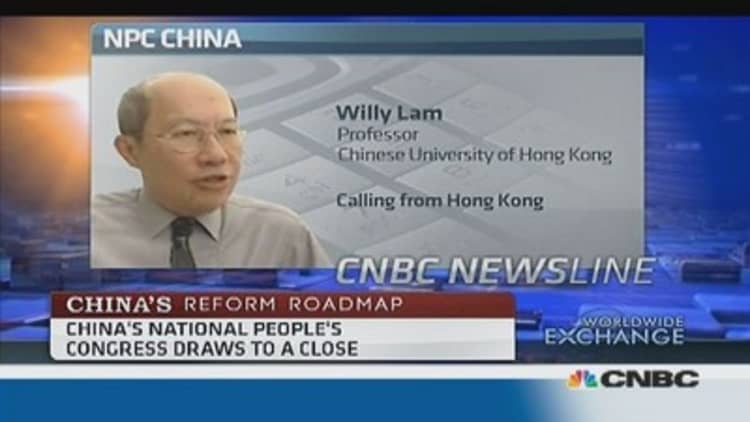Another day, another batch of weak data from China. Retail sales and industrial production in February were up, but both fell short of expectations.
Retail sales rose a relatively brisk 11.8 percent, yet below forecasts of 13.5 percent and the slowest pace since 2005. Industrial Production logged an 8.6 percent gain, below estimates of 9.5 percent and the lowest level since 2009. Thursday's news confirms other figures indicating China's economy is indeed slowing.
I noted yesterday that many traders already felt that China's GDP would not be near the 7.5 percent target rate, and would likely be somewhere in the 6 percent range. This morning Marc Faber, he of the Gloom, Doom and Boom Report, told CNBC Asia he thought China's GDP was growing at half the official rate—roughly 4 percent.

Separately, Chinese premier Li Keqiang said more defaults on Chinese bonds and financial products were "unavoidable."
What's the upshot of all this? The rose 1.1 percent because there was talk the the People's Bank of China may begin another stimulus program. In other words, more debt to cover up the debt.
Elsewhere
1) I noted yesterday that despite lots of bearish comments that prices were "frothy," there is little sign of deterioration in the market. Bespoke Investment has now chimed in, noting that breadth levels remain healthy; none of the 10 sectors of the S&P 500 have less than 60 percent of their stocks above the 50-day moving averages.
According to the firm's analysts, 74.8 percent of the stocks in the index are above the 50-day moving average. Technology and Financials—two critical sectors—are both are above that level.
2) Chinese e-commerce behemoth Alibaba is "95 percent certain" to list in New York, according to a report in The Financial Times. That leaves Hong Kong out in the cold on what may be the biggest initial public offering (IPO) of the year, and New York very much in.
There have been much-publicized disputes between Alibaba and Hong Kong authorities over the company's board structure. It's unclear how big the IPO might be, but it could be larger than Visa's $18 billion mega-offering, which was the largest ever in U.S. markets.
No word on which exchange they might list on, however. The New York Stock Exchange has no comment.
3) In the retail world, Williams Sonoma is bucking a trend while Dollar General continued with more of the same. The latter reported lower than expected revenues and guided 2014 earnings below consensus. In Dollar General's case ,the range was $3.45-$3.55 against consensus of $3.69. Revenues of $18.9 to $19.0 billion is also below consensus of $19.29 billion, but they did give a six percent dividend hike.
According to Dollar General's CEO Rick Dreiling: "Athough some of the severe weather impact has continued into the first quarter, we are pleased with our sales performance on days when weather is more normalized."
Things were a bit different over at Williams Sonoma, though. While earnings and revenues were slightly better than expected, 2014 EPS of $3.05-$3.15 is below consensus of $3.19. That said, the revenue estimates are surprisingly strong: $4.63 to $4.71 billion, bracketing mostly above consensus of $4.64 billion. Same store sales are expected to be up 5 to 7 percent.
4) The is rallying. Some are saying there are large Long Term Refinancing Operation (LTRO) payments from banks being made, at levels much higher than expected. This means that cash is being drained out of the eurozone financial system, which is pushing the single currency up. The LTRO were short-term loans (largely one and three years, mostly) that was initiated by the ECB in 2011 as a way to pump liquidity into banks at the height of the debt crisis.
—By CNBC's Bob Pisani


